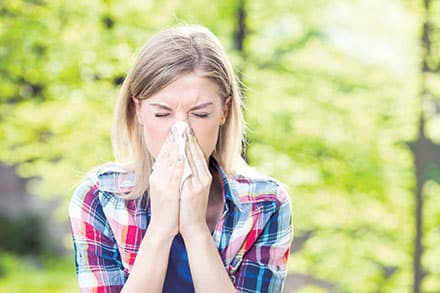Both seasonal allergies and the common cold have many symptoms in common, such as sneezing, stuffy nose and a sore throat, just to name a few. And if that isn’t confusing enough, cold bugs can be just as common during the spring months as seasonal allergies. So, to help you determine which one you may have, Hoyt Gazaway, MD, a Gwinnett Medical Group Primary Care provider, provides some of the key symptoms to be on the lookout for.
It’s probably a cold if…
You have a fever. A fever is your body’s way of fighting off certain bacteria and viruses; therefore, if it’s just allergies, you won’t have a fever. Keep in mind that it’s normal for temperature to vary between 97 degrees and 99 degrees throughout the day, but if it’s above this range for more than a few days, make sure to see your doctor.
You have a cough. When you’re congested from a cold, the mucus and other foreign irritants can cause frequent, painful coughing. While some allergies may cause coughing, it is more common with a cold.
Symptoms get worse. After you are exposed to cold germs, it usually takes one to three days to begin showing symptoms. Unfortunately, that’s just the start; symptoms usually continue to build up, peaking around days four and five.
Your body is achy. In addition to the irritation you have in your head, you may also experience bodily aches and pain. In part, this is due to the fact that you’re feeling weak, tired and uncomfortable. You may also be experiencing inflammation throughout your body, which can make muscles and joints feel painful.
It doesn’t last very long. Most often, a cold will last anywhere between three days to two weeks. However, by day 14, your symptoms should be nearly gone.
It’s probably allergies if…
You sneeze frequently. While sneezing can certainly be a common symptom of a cold, you’ll notice more frequent sneezing with allergies. When you breathe in allergens that irritate your nose, sneezing is your body’s way of getting it out.
Your nose isn’t just runny, it’s itchy. With allergies, your nose may become stuffed, runny and even itchy. When your body is responding to an allergen, it releases histamine, which causes nasal itching.
Your eyes are watery and itchy. Your eyes produce tears as a natural way to clean and lubricate your eyes. However, when your eyes are exposed to an irritant, like an allergen, they may produce excess tears. You may also experience itching and burning.
It lasts more than two weeks. Unlike a common cold, allergy symptoms will continue to persist as long you are exposed to the allergen. The most common allergens are typically in season from March to May.
Soothe your seasonal suffering. Whether you’re fending off a cold, or seeking effective treatment for seasonal allergies, the experienced primary care providers of Gwinnett Medical Group can help. With a wide-array of services and resources, as well as the latest in treatment options, you’ll receive comprehensive care customized to fit your unique health needs.
You can make a doctor’s appointment anytime or anywhere with Gwinnett Medical Group’s convenient online scheduling. State by visiting gwinnettmedicalgroup.com/scheduling.


